The Most Obscure and Forgotten Champions In New Japan History
March 24, 2022
By Ryan Porzl
This month, New Japan Pro Wrestling celebrates an awesome milestone of 50 years. Since 1972, the King of Sports has been one of the premier wrestling promotions in the world and in the month of March, we will look back at New Japan. I already wrote an article talking about wrestlers fans knew but probably didn't know they held a championship in New Japan so I'll move on to part 2. With a promotion that's been around for half a century, you will always have your share of legends as well as obscure names that have been champion. Not every champion can be an Antonio Inoki, Tatsumi Fujinami, Riki Choshu, The Three Musketeers, Jushin Thunder Liger, Hiroshi Tanahashi, and Kazuchika Okada. Every now and then, you're going to get someone who fades into obscurity and when you hear their name, you go "who?". Here, we'll take a look at New Japan's most forgotten and obscure champions in their history.
Note: The pictures are not mine but those that I found on google though I know some came from New Japan Pro Wrestling and Puroresusystem.fandom.com
Tadao Yasuda
Title Held: IWGP Heavyweight Championship
We'll start with an IWGP Heavyweight Champion and arguably the weakest champion to hold the belt. Originally a former sumo who competed for 13 years, Yasuda trained in the New Japan dojo and turned pro in 1994. For the first six years of his career, Yasuda was nothing special and was mostly an undercard wrestler who looked like he would never advance much in his career. By 2000, things would change for Yasuda when New Japan founder Antonio Inoki began to retake control of New Japan and began invoking his Inokism philosophy of mixing wrestling with mixed martial arts due to the boom period MMA was going through. Yasuda would become a pet project of Inoki and began training in MMA and fought on and off over the next few years. After going 1-1 in his first two fights, things would change for Yasuda at Inoki Bom-Ba-Ye 2001 when New Japan's hottest rising star Yuji Nagata would suffer an embarrassing quick loss to Kickboxing/MMA legend Mirko Cro Cop while Yasuda would score his biggest win over Kickboxing legend Jerome le Banner. With the win, Yasuda's stock skyrocketed in Inoki's eyes and when Kazuyuki Fujita was forced to vacate the IWGP Heavyweight Championship in January 2002, Yasuda would make his mark. In February 2002, New Japan would hold a tournament to crown a new champion during their Fighting Spirit 2002 tour. Yasuda would enter and defeat Giant Silva on February 1st, followed by Masahiro Chono on February 16th before winning the tournament and the vacant championship by defeating Yuji Nagata in the finals the same night. Ultimately, Yasuda's reign wouldn't last as he made one successful title defense on March 21st against Hiroyoshi Tenzan during the Hyper Battle 2002 tour before dropping it to Nagata on April 5th at Inokism Fighting Spirit Special. After losing the championship, Yasuda would continue being featured in New Japan for another two years as part of the Makai Club and got some title shots but was never able to wear New Japan gold again. After falling down the cards, he left New Japan in 2004 and became a journeyman for the remainder of his career mostly working for ZERO1 and HUSTLE, achieving championship success in the latter. Unfortunately, Yasuda was known during this time for his vices which was gambling as he was known as an addicted gambler who acquired a big debt. Eventually, he earned the nickname "Borrowing Money King" due to his constant borrowing money from everyone, including Yakuza families to pay off his debts. Probably because of this, Yasuda would attempt suicide in 2007 by inhaling carbon monoxide but was thankfully saved and suffered no brain damage. Afterwards, Yasuda continued wrestling until retiring in 2011.
Masayuki Naruse
Title Held: IWGP Junior Heavyweight Championship
Another benefactor of Inokism, Naruse first turned pro in 1992 where he was trained by New Japan alumni and wrestling/MMA legend Akira Maeda and turned pro for Maeda's Fighting Network RINGS promotion. After starting as a wrestler, Naruse made the transition to MMA when RINGS did in 1995 where he posted a lackluster record of 7-12 but did make history becoming the inaugural and only RINGS Light Heavyweight Champion. As RINGS began declining, Naruse decided to return to wrestling and signed with New Japan at the perfect time in 2001. With Antonio Inoki infatuated with MMA, Naruse got a big push upon arrival as he defeated Minoru Tanaka for the IWGP Junior Heavyweight Championship in his debut at Dome Quake on July 20, 2001. Naruse would hold the championship for two and a half months during which time he made one successful title defense against El Samurai during the G1 World tour on September 16th before losing the championship in a squash loss to Kendo Kashin at Indicate of Next on October 8th. After losing the championship, Naruse lost his push though he continued to get title shots here and there but was never able to win another championship in New Japan though he did venture to All Japan and won their All Asia Tag Team Championship with Mitsuya Nagai. After nearly five years in New Japan, Naruse left New Japan in early 2006 and largely retired having only wrestled once in 2015. He also returned to Mixed Martial Arts where he went 2-2 before retiring in 2014.
Wataru Inoue
Title Held: IWGP Junior Tag Team Championship, IWGP Junior Heavyweight Championship, and IWGP Tag Team Championship
I may have said this in previous articles but it never ceases to amaze me how someone can be 75% of the grand slam and yet, still be forgotten but Inoue is in that position. Inoue originally trained in the New Japan dojo and turned pro in October 1999 around the same time as Hiroshi Tanahashi and Katsuyori Shibata. After spending the first few years paying his dues and gaining experience, Inoue began to slowly move up the cards by 2001 by regularly competing in the Best of the Super Juniors tournaments. After six years of working his way up the cards, Inoue would start to taste gold. On March 4, 2005, during the Big Fight Series 2005 tour, Inoue would team with junior legend Koji Kanemoto to defeat Gedo and Jado to win the IWGP Junior Tag Team Championship. Inoue and Kanemoto held the gold for two months and made two successful defenses. Their first would be a rematch against Gedo and Jado on March 21st on the same tour. The second defense would be against El Samurai and Masahito Kakihara on April 9th during the Ebina Shakaifukushi Charity. They would lose the belts to Hirooki Goto and Minoru on May 14th on Nexess VI.
Two years after his Jr. Tag Team title loss, Inoue would once again taste gold, this time in the singles division. On December 8, 2007, at 35th Anniversary Tour ~ Circuit 2007 New Japan Alive Tour, Inoue would defeat Ryusuke Taguchi to win the IWGP Junior Heavyweight Championship. He would hold the belt for six months and make three successful title defenses. His first defense would be against TNA's Christopher Daniels on January 4, 2008 at Wrestle Kingdom II in Tokyo Dome. His second defense would be a rematch against Taguchi on January 27th during the Circuit 2008 NEW JAPAN ISM tour. His third defense would be a rematch against Daniels on April 27th during the Circuit 2008 New Japan Brave tour. Unlike some on this list, Inoue wouldn't lose the title in the ring as he would vacate it on June 16th upon moving up to heavyweight.
After moving up to heavyweight, Inoue would eventually join Yuji Nagata's Seigigun or Blue Justice Army stable and eventually formed a team with Nagata which resulted in his last championship. On May 3, 2010, Inoue would team with Nagata to defeat champions NO LIMIT (Tetsuya Naito and Yujiro Takahashi) and Bad Intentions (Giant Bernard and Karl Anderson) in a three way to win the IWGP Tag Team Championship. Inoue and Nagata would make no successful title defenses as they lost the belts in a three way rematch during their first defense to Bad Intentions on June 19th at Dominion 6.19. After losing the titles, Inoue would largely remain in New Japan's midcard and largely was directionless outside of winning New Japan's G1 Tag League in 2010. Sadly, in March 2013, Inoue would suffer a severe neck injury which eventually resulted in him announcing his retirement on February 2, 2014 and followed with a retirement ceremony on April 2nd. Since his retirement, Inoue has continued to work for New Japan backstage.
Osamu Kido
Title Held: IWGP Tag Team Championship
Osamu Kido is someone who worked in New Japan on and off for 30 years but can still be considered forgotten. Kido was originally trained in the JWA dojo and turned pro in 1969 for the Japanese Wrestling Alliance. In 1972, Kido would leave JWA after Antonio Inoki was fired and reportedly helped Inoki start New Japan Pro Wrestling. Outside of his learning excursion from 1975-1976, Kido would work for New Japan during their first twelve years but was largely stuck in opening and mid card matches due to his lack of expression and simplistic wrestling moves. From 1984-1985, Kido then went to the Universal Wrestling Federation and achieved some popularity due to his style. When the UWF fell apart, Kido returned to New Japan and was part of the New Japan/UWF rivalry and it would be here where he would win his only championship. On August 5, 1986, during the Burning Spirit in Summer tour, Kido would team with Akira Maeda to defeat the inaugural IWGP Tag Team Champions Tatsumi Fujinami and Kengo Kimura for the belts. Kido and Maeda would hold the gold for 49 days during which time they made one successful title defense as they went to a double countout against Fujinami and Kimura on August 29th during the Challenge Spirit 1986 tour before dropping the belts back to Fujinami and Kimura on September 23rd during the same tour. After losing the titles, Kido went back to the midcard where he remained for the remainder of his career. He would then participate in tournaments and got several more tag title shots but was never able to win anything. Eventually, Kido would retire on November 2, 2001 and remained retired for four years outside of a one night only return in 2003 during which time he helped train wrestlers including Shinsuke Nakamura. However, as is usually the case with retirements, Kido eventually returned to the ring in 2005 where he made appearances for Big Mouth Loud, All Japan Pro Wrestling, and Inoki Genome Federation before retiring for good in 2010.
The Mad Dogs
Title Held: IWGP Tag Team Championship
The Mad Dogs were a team consisting of Tatsutoshi Goto and Michiyoshi Ohara. Both trained in the New Japan dojo and started working in New Japan with Goto debuting in 1982 while Ohara debuted in 1990. After paying their dues and going on learning excursions, the two began teaming in 1993 as The Mad Dogs after both joined the Heisei Ishigun stable and worked for a time in WAR where they captured the promotions Six Man Tag Team Championship with leader Shiro Koshinaka. After years in the midcard and not seemingly going anywhere, they would finally strike gold out of nowhere. On June 27, 1999 during the Summer Struggle 1999 tour, The Mad Dogs would upset the team of Kensuke Sasaki and Shiro Koshinaka for the IWGP Tag Team Championship. The Dogs would hold the championships for two months during which time they successfully defended against Koshinaka and Kengo Kimura on the same tour on July 21st before losing the titles to Manabu Nakanishi and Yuji Nagata at Jinju Climax on August 28th. After losing the belts, The Mad Dogs largely returned to the midcard though they did become members of Masahiro Chono's Team 2000 stable. They continued teaming until 2001 when Ohara left New Japan and briefly did MMA. Eventually, they reunited in 2003 as part of the Crazy Dogs stable with Hiro Saito and MMA legend Enson Inoue but broke up in 2004 when Ohara left again. Goto would follow in 2006 and the two eventually continued working indie shows until Ohara retired in 2008 due to injuries in a car accident and Goto retired in 2011.
Norio Honaga
Title Held: IWGP Junior Heavyweight Championship (3x)
Honaga is one of those guys who, for so long, didn't look like he do much in wrestling and while his time in the sun was brief, he did have some moments to fondly look back on. Trained in the New Japan Dojo, Honaga turned pro in 1980 and remained there until 1984 when he followed Riki Choshu to All Japan Pro Wrestling. Honaga eventually followed Choshu back in 1987 and for the next few years couldn't gain any traction and it looked like he would be destined to be an undercard type wrestler but all that changed. In April 1991, Honaga would enter the Top of the Super Juniors tournament which not only had the tournament on the line but it also had the vacant IWGP Junior Heavyweight Championship as champion Jushin Thunder Liger vacated it so it could be put on the line in the tournament. Despite being an underdog, Honaga would shock many by not only reaching the finals but on April 30, 1991, he would pull off the big upset by defeating Liger to not only win the tournament but the vacant IWGP Junior Heavyweight Championship. Honaga would only hold the belt for 43 days and make two successful title defenses with his first defense being against Pegasus Kid (Chris Benoit) on May 25th during the Crush the Super Heavy II tour and the second would take place on May 31st against Liger on the same tour before eventually losing the title to Liger on June 12th at Fighting Connection ~ Ultra-High and Mighty Declaration II.
A few months later, Honaga return to champion status when he regained the Junior Heavyweight Title for the second time by defeating Akira Nogami on November 5, 1991 during the Tokyo 3Days Battle tour. Honaga would hold the belt for three months and made one successful title defense defeating Negro Casas on December 11th during the Battle Final 1991 tour. He would eventually lose the championship to Liger on February 8, 1992 during the Fighting Spirit 1992 tour in a title vs. title match as Liger defended the WCW Light Heavyweight Championship.
Honaga would win the championship for a third and final time in 1994. In September 1994, Jushin Thunder Liger would be forced to vacate the IWGP Junior Heavyweight Championship due to an ankle fracture injury and New Japan would hold a tournament to crown a new champion. Honaga would enter the tournament and emerge victorious on September 27, 1994 defeating Wild Pegasus (Benoit) in the finals for the championship. Honaga's third reign would be his most successful as he held it for nearly five months and make six successful title defenses with his first being against Shinjiro Otani on October 30th during the Super Grade Tag League 1994 tour. His second defense would be against Wild Pegasus on November 25th during the Battle Final 1994 tour. His third defense would be against Black Tiger II (Eddie Guerrero) on December 11th during the same tour. His fourth defense would be a day later on December 12th during the same tour against Gran Hamada. His fifth defense would be against The Great Sasuke on January 4, 1995 at the BATTLE 7 show. His sixth and final defense would be against Dean Malenko on February 3rd during the Fighting Spirit 1995 tour. After six successful defenses, Honaga would drop the championship to Koji Kanemoto on February 19th during the same tour. The loss of the championship marked the end of Honaga's peak in wrestling as his stock began to drop and he returned to the undercard and midcard until retiring on April 30, 1998. After retiring, Honaga continued working for New Japan as a referee until leaving in 2003 to work for Riki Choshu's World Japan promotion. In 2007, Honaga would be involved in a serious car accident that left him blind in his right eye and lost the use of his left leg. Since then, he's left the wrestling business and became a born again Christian.
Kazuo Yamazaki
Title Held: IWGP Tag Team Championship (3x)
Yamazaki is another one of those guy who had his share of success but despite that and multiple title reigns, he largely flew under the radar and retired fairly young. Yamazaki would originally train in the New Japan dojo and turned pro in 1982. After spending two years paying his dues, Yamazaki would leave New Japan in 1984 along with several other wrestlers to form the Universal Wrestling Federation where he worked for a year before the promotion fell apart in late 1985 over the direction of the company. Yamazaki would return to New Japan after that and it would be here where he won his first championship. On September 1, 1987 during the Sengoku Battle Series 1987 tour, Yamazaki teamed with Yoshiaki Fujiwara to defeat Akira Maeda and Nobuhiko Takada to win the IWGP Tag Team Championship. Yamazaki and Fujiwara would hold the belts for nearly five months during which they made two successful title defenses. The first would be on October 17th during the Toukon Series 1987 tour where they retained over Hiro Saito and Super Strong Machine. The second successful defense would be on December 27th at Year End in Kokugikan 1987 where they went a double count out against Takada and Osamu Kido. They would finally lose the gold to Tatsumi Fujinami and Kengo Kimura on January 18, 1988 during the New Year Golden Series 1988 tour.
After losing the championship, Yamazaki would eventually leave New Japan in 1988 and spent the next few years in shoot style wrestling promotions like Newborn UWF and UWF-i until returning to New Japan in 1995. Less than a year back, Yamazaki would once again be a tag team champion. On June 12, 1996 during the Best of the Super Juniors III tour, Yamazaki would team with Takashi Iizuka to defeat Shinya Hashimoto and Junji Hirata to win the IWGP Tag Team Championship. Yamazaki and Iizuka would make no successful title defenses before losing them one month later on July 16th to Masahiro Chono and Hiroyoshi Tenzan.
A year after the second title loss, Yamazaki would go on to form another team, this time with Kensuke Sasaki and would win gold for the third and final time. On August 10, 1997 at The Four Heaven in Nagoya Dome, Yamazaki and Sasaki would defeat the Bull Powers which comprised of Manabu Nakanishi and Satoshi Kojima to win the gold. However, for the second straight time, Yamazaki would make no successful title defenses as he and Sasaki lost the belts to Keiji Mutoh and Masahiro Chono on October 19th during the nWo Typhoon 1997 tour. After losing the championship a third time, Yamazaki would go into the midcard for the remainder of his career though he did have one last highlight as he made it to the finals of the 1998 G1 Climax tournament. By 1999, he began wrestling less and less until finally retiring on January 4, 2000. Since his retirement, Yamazaki continued working for New Japan as a trainer and commentator.
Shota Chochishvili
Title Held: WWF Martial Arts Championship
The name "Shota Chochishvili" isn't a name most wrestling fans would know due to his short career and the fact he was barely a wrestler as he had less than five matches under his belt. A Georgian from the Soviet Union, Chochishvili was a decorated judoka who peaked in the 1970s where he captured a gold medal in the 1972 Olympics and a bronze in the 1976 games all the while winning a bronze medal in the 1975 World Championship along with several medals in the European Championships. During and after Chochishvili's peak, Antonio Inoki helped build his legend by facing various decorated martial artists in wrestling matches and fixed type fights so the thought of someone like Chochishvili meeting him didn't seem out of the ordinary and it eventually happened during a historical show. On April 24, 1989, New Japan would present their first Tokyo Dome show called Battle Satellite in Tokyo Dome. The main event saw Chochishvili make his in-ring debut against Inoki in a fixed MMA style match up and defeated him for the WWF Martial Arts Championship, a championship that was originally awarded to Inoki when New Japan and the WWF were working together. Ultimately, Chochishvili made no successful title defenses as he lost the championship to Inoki only one month later on May 25th at Battle Satellite in Osaka in another fixed MMA style fight. After losing the championship, Chochishvili only wrestled one more time when he teamed with Inoki to defeat Masa Saito and Brad Rheinghans on December 31, 1989 in the main event of a special show New Japan would run in the Soviet Union called Martial Arts Festival. After retiring from wrestling, Chochishvili became a judo coach and then became vice president of the Georgian Olympic Committee and of the Georgian Judo Federation. Sadly, he would suffer with health problems beginning in 2003 as he underwent heart surgery before being diagnosed with cancer which he fought for six years until passing away from leukemia on August 27, 2009 at the age of 59.
 |
| Yoshie (left) with Hiroshi Tanahashi |
Yutaka Yoshie
Title Held: IWGP Tag Team Championship
Yoshie is one of those guys who was a good talent but who's peak in New Japan came during the early 2000s Inokism years making him another guy who probably never got the opportunities he deserved as Inoki focused more on tough guys and those with MMA backgrounds. Yoshie trained in the New Japan dojo and turned pro in 1994 where he then spent the next several years paying dues before going on a learning excursion where he bulked up. Upon returning in 2000, he would get the occasional big win and tournament win but it wouldn't be until 2003 when he finally made it to championship status. On June 13, 2003 at Crush, Yoshie would team with Hiroshi Tanahashi to defeat Masahiro Chono and Hiroyoshi Tenzan for the IWGP Tag Team Championship and thus, ending their then recording setting 446 day reign as champions. Yoshie and Tanahashi would reign for six months and make three successful defenses. Their first would be against Makai Club members Makai #4 (Katsuyori Shibata) and Makai #5 (Mitsuya Nagai) on July 9th during the Summer Struggle 2003 tour. Their second defense would be against Jushin Thunder Liger and Koji Kanemoto on August 24th during Hall Crush. Their third defense came during the 2003 G-1 Tag League against Mike Barton (Bart Gunn) and Jim Steele on October 21st during the 2003 G-1 Tag League tour. They would finally lose the belts to Tenzan and Osamu Nishimura on December 14th at Battle Final 2003. After losing the titles, Yoshie went back to the midcard and had almost no direction. Finally, in January 2006, Yoshie decided to leave New Japan and become a freelancer where he's enjoyed some success winning championships and tournaments in promotions such as All Japan, ZERO1, Muga Pro, and Toryumon. As of 2022, Yoshie still competes.
Salman Hashimikov
Title Held: IWGP Heavyweight Championship
One of the classic wrestling stereotypes for decades was the evil Soviet or Russian but every evil Soviet was from a different country in real life like the United States, Canada, or Europe. So, there had to be some people out there wondering "Have there ever been any legit Soviet/Russian wrestlers?". Well, there were and one made history. That one was Salman Hashimikov. Hashimikov was a Chechen from Russia who was a highly decorated freestyle wrestler during the 1970s and early 80s capturing two European gold medals, two European silver medals, and four golds in the World Championships. With those credentials, it seemed only natural he go into professional wrestling and by the end of the 80s he would do just that as he became one of several Russian wrestlers who trained in the New Japan dojo under Antonio Inoki. After turning pro in February 1989, Hashimikov quickly rose through the ranks until not only becoming a champion but making history. On May 25, 1989 at Battle Satellite in Osaka, Hashimikov would defeat Big Van Vader to win the IWGP Heavyweight Championship. With the win, Hashimikov not only became the first European to hold the championship but he became the only Russian born wrestler to have won a major pro wrestling championship in a capitalist country during the Cold War. Sadly, Hashimikov historic reign wouldn't last as he held the championship for less than two months and made no successful defenses before losing it to Riki Choshu on July 12th. After losing the championship, Hashimikov continued regularly competing for New Japan for the remainder of 1989 before appearing only sporadically through 1990 until leaving in September 1990. Hashimikov then made one appearance for the NWA/WCW at Starrcade 1990 where he teamed with fellow New Japan dojo graduate Victor Zangiev in the Pat O'Connor Memorial Tournament where they made it to the semifinals. After taking several years off, Hashimikov then returned to Japan, this time competing for UWF-i from 1993-1994. During which, he challenged Nobuhiko Takada for their Pro Wrestling World Heavyweight Championship but wasn't successful. He competed in six matches for the promotion before retiring in August 1994.
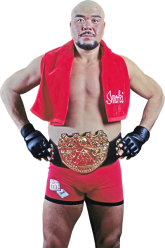

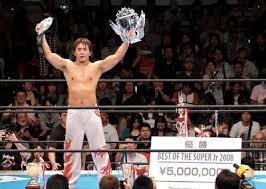

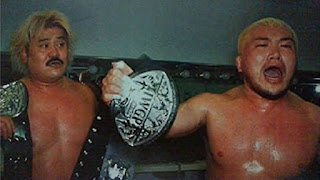
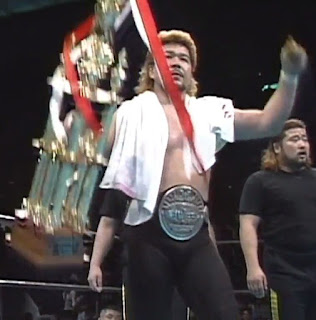

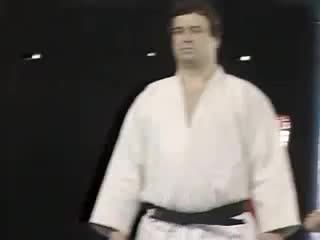

No comments:
Post a Comment